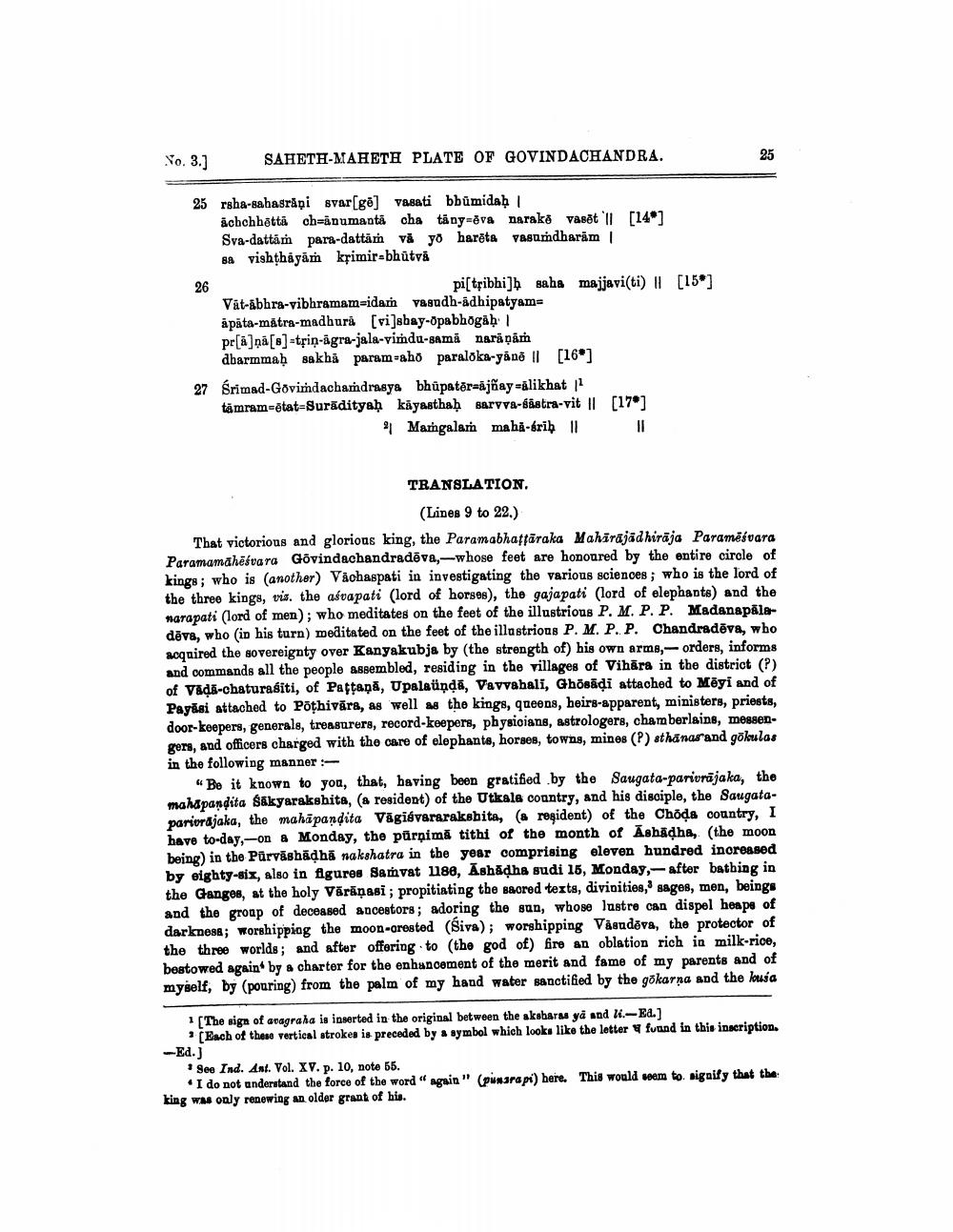________________
No. 3.]
25 rsha-sahasrapi svar[ge] vasati bbümidaḥ |
achchhättä ch-anumanta cha tany-ova narakē vaset || [14] Sva-dattam para-dattam va yo harěta vasumdharam | sa vishṭhāyām krimir-bhūtvä
26
SAHETH-MAHETH PLATE OF GOVINDACHANDRA.
pi[tribhi]b saha majjavi(ti) || [15*]
Vat-abhra-vibhramam=idam vasudh-adhipatyam= apata-matra-madhura [vi]shay-öpabhögaḥ | pr[a]na [s]-trin-agra-jala-vimdu-sama narāṇāṁ dbarmmaḥ sakhā param-aho paraloka-yane | [16*] 27 Śrimad-Govindachamdrasya bhüpatēr=ajñay-alikhat 1 tamram-etat-Suradityaḥ kayasthaḥ sarvva-sastra-vit || [17] 2 Mamgalam maha-érib ||
||
25
TRANSLATION.
(Lines 9 to 22.)
That victorious and glorious king, the Paramabhattaraka Maharajadhiraja Paramesvara Paramamaheśvara Govindachandradeva,-whose feet are honoured by the entire circle of kings; who is (another) Vachaspati in investigating the various sciences; who is the lord of the three kings, vis. the aśvapati (lord of horses), the gajapati (lord of elephants) and the narapati (lord of men); who meditates on the feet of the illustrious P. M. P. P. Madanapaladēva, who (in his turn) meditated on the feet of the illustrious P. M. P. P. Chandradeva, who acquired the sovereignty over Kanyakubja by (the strength of) his own arms,- orders, informs and commands all the people assembled, residing in the villages of Vihara in the district (?) of Vada-chaturasiti, of Pattana, Upalaüṇḍa, Vavvahali, Ghösäḍi attached to Meyi and of Payasi attached to Pōṭhivars, as well as the kings, queens, heirs-apparent, ministers, priests, door-keepers, generals, treasurers, record-keepers, physicians, astrologers, chamberlains, messengers, and officers charged with the care of elephants, horses, towns, mines (?) sthānas and gōkulas in the following manner :
"Be it known to you, that, having been gratified by the Saugata-parivrājaka, the mahapandita Sakyarakshita, (a resident) of the Utkala country, and his disciple, the Saugataparivrajaka, the mahapanḍita Vägisvararakshita, (a resident) of the Choda country, I have to-day,-on a Monday, the purnima tithi of the month of Ashadha, (the moon being) in the Pürväshäḍhä nakshatra in the year comprising eleven hundred increased by eighty-six, also in figures Samvat 1188, Ashadha sudi 15, Monday, after bathing in the Ganges, at the holy Väräṇasi; propitiating the sacred texts, divinities, sages, men, beings and the group of deceased ancestors; adoring the sun, whose lustre can dispel heaps of darkness; worshipping the moon-orested (Siva); worshipping Vasudeva, the protector of the three worlds; and after offering to (the god of) fire an oblation rich in milk-rice, bestowed again by a charter for the enhancement of the merit and fame of my parents and of myself, by (pouring) from the palm of my hand water sanctified by the gōkarna and the kusa
1 [The sign of avagraha is inserted in the original between the aksharas ya and li.-Ed.]
2 [Each of these vertical strokes is preceded by a symbol which looks like the letter found in this inscription. -Ed.J
See Ind. Ant. Vol. XV. p. 10, note 55.
I do not understand the force of the word "again" (punarapi) here. This would seem to signify that the king was only renewing an older grant of his.




